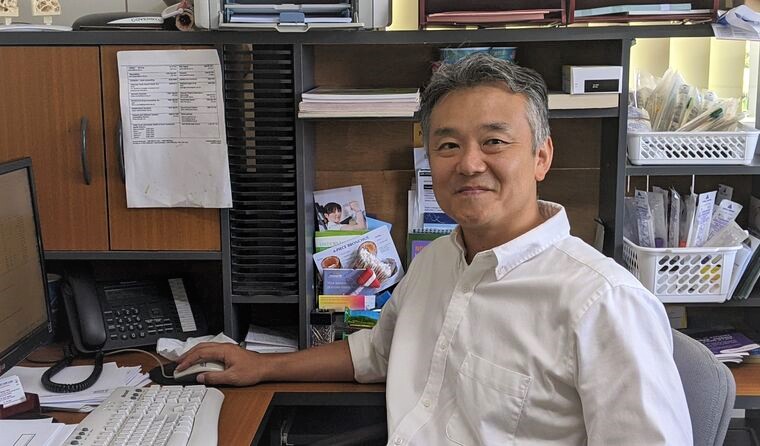News
‘We can have a really positive impact on society’
GPs discuss how the RACGP’s Alcohol and Other Drugs Education Program has helped boost their skills, and why it is so important.
 The program allows GPs to discuss their learning and cases with colleagues, mentors and doctors with specific interests.
The program allows GPs to discuss their learning and cases with colleagues, mentors and doctors with specific interests.
Richmond GP Dr Emily Nixon began the RACGP’s Alcohol and Other Drugs GP Education Program after realising the significant challenges her community faced.
The inner-Melbourne RACGP Fellow says many patients initially reported other health issues, but after some time their challenges with alcohol or other drugs (AODs) would often emerge.
‘It came up so frequently that I realised I needed more skills,’ she told newsGP.
So together with a group of other GPs, Dr Nixon undertook the ‘very efficient’ course to boost her knowledge and skills in assessing and enquiring about alcohol and other drugs, withdrawal, and treatments and medications.
In addition to her increased knowledge, Dr Nixon says the access to experienced practitioners is very helpful.
‘All of the people leading the sessions had an interest in drug and alcohol treatment and experience,’ she said.
‘They offered a few anecdotal tips that were invaluable. The people who run it are so passionate. I found that was inspiring and thought, “This is achievable to do in my practice”.’
According to the Australian Institute of Health and Welfare (AIHW), one in five people over aged 14 reported being a victim of alcohol-related crime in 2019, and one in seven people had more than 11 standards drinks at one time over the last year. About one-third of people who sought help for substance use did so for alcohol.
To help GPs assist these patients, the RACGP has created a number of different courses tailored for differing clinical experience. Dr Nixon completed the Treatment Skills training, which offers evidence-based practical skills for GPs to support and treat their patients.
Delivered online via Zoom in three sessions or in a self-directed format, the program allows GPs to discuss their learning and cases with colleagues, mentors and doctors with specific interests.
A $1200 grant is also available for GPs who complete the Treatment Skills course, while those who finish the Advanced Skills to address alcohol and other drug issues in the community can receive a $2500 grant.
Both courses build on the AOD Connect service available to all GPs, which is a forum to discuss cases held over teleconference each Thursday evening.
Dr Tatsuo Nagashima works across three diverse locations in southeast Queensland – the Gold Coast hinterland, Gympie and Warwick – and also completed the course recently to better support his patients.
He told newsGP the course’s material is applicable to every community, given the widespread challenges with substance misuse.
‘In Australia alcohol and other drug problems are very common and a GP will face those problems on a daily basis,’ he said. ‘Without the skills to tackle these problems, everyday tasks will be very difficult.’
The course has helped him identify additional supports and medications that can assist dependency, and he has since used them in his work.

Dr Tatsuo Nagashima believes the AOD course material is applicable to every community.
‘Having options and not having options makes a big difference,’ Dr Nagashima said. ‘Before that course I wasn’t so familiar with those pharmacological management plans.’
Regional Victoria GP Dr Thileepan Naren completed the Advanced Skills training at the start of this year, having already finished the Treatment Skills program. He credits his mentor, Dr Ferghal Armstrong, for improving his approach to addiction medicine, which included a visit to the supervised injecting room in Richmond to see how other doctors assist their patients.
‘It was really useful in my development,’ he said, noting the personalised content available in the advanced training.
Dr Naren says it is important to acknowledge and treat substance disorders as part of ‘whole-person care’.
‘Just because someone comes to you with a substance-use disorder, it doesn’t mean you turn them away, just like you wouldn’t turn away someone with heart disease or diabetes or respiratory problems,’ he said.
‘I find that if people feel they’re being treated with respect, or they’re being listened to, then they feel safe to disclose some of their other health issues.’
Dr Naren recommends the courses to increase the level of awareness, confidence and understanding across the GP community so they can offer beneficial treatments in a community setting.
‘It’s very easy to do good quality AOD work in a general practice,’ he said. ‘You can really make great improvements to people’s health, their safety and overall sense of wellbeing.
‘It can be not only something that changes your practise, but it can also change the course of your patient’s trajectory through the healthcare system. We can have a really positive impact on society so it’s something I highly recommend.’
Applications for the RACGP’s Alcohol and Other Drugs GP Education Program close on 31 July.
Log in below to join the conversation.
addiction medicine alcohol and other drugs RACGP
newsGP weekly poll
Which of the following areas are you more likely to discuss during a routine consultation?